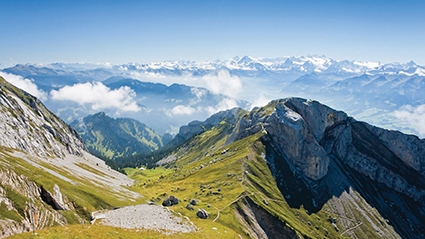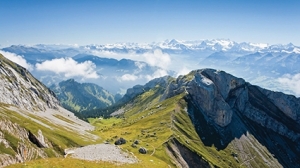Georgia’s Fateful Geography
Op-Ed
Nations rise and fall, as have both empires and states throughout recorded history. Great leaders are followed by lesser and economic development always varies. A constant, though, behind all of that, is geography: the physical geography of rarely changing features such as rivers, mountains, deserts, large forests, and seas.
Just how geography influences the thinking of people living in a certain territory is a difficult subject to discuss. For instance, for Russia, its large swathes of lands from the Far East to Moscow are a subject of national pride. However, those territories, commonly known as steppes and taiga, also infinitely influence Russian people’s mentality as it was from there that the powerful Mongol and other invaders came.
The choice of invasion routes is generally conditioned by geographic features. Another example from Russia: the country’s western frontier is a part of the large North European plain connecting Russia with both eastern and western Europe. No wonder Moscow is now very much obsessed with the NATO/EU advance from that direction. The Russians remember well that Charles XII, Hitler and Napoleon all came via this North European plain.
Geography also influences the economic and technological development of a country. For instance, the very fact that Israel’s location does not procure much water has led to the country developing state-of-the-art technologies to filter and generate it.
Surprisingly, a lack of resources could at times be a powerful impetus for development. Europe’s centuries-old successes in technologies have been largely conditioned by a lack of resources. And we should not forget that new territorial discoveries made by Columbus, Magellan and others were primarily a result of a need for more resources.
Yet another example is how geography affects a country’s military stance. In the case of Russia, with its indefensible frontiers, the Kremlin has to keep more than a million soldiers, while in the US, the country needs to uphold its economic dominance through its military might in the oceans.
The Battle with Fate
Yet, while in some cases geography is a boost to a country’s historical development, it can be a damning fate, too. A trip across Georgia helps us understand why the country stands where does at the moment. There are numerous features which can be considered advantageous, for instance, rivers, mountains, gorges and forests (however small the latter are), all making it virtually impossible for an invader to occupy and keep the country for an extended period. Indeed, this would explain why, historically, so many invasions of Georgia have taken place, but very few, if any, proved long-lasting. Imagine, Tamerlane, that Central Asian invader, carried out eight expeditions to Georgia. Yes, Arabs and Mongols were in Georgia for centuries, but they did not deploy armies to control it. In other words, they were not “physically” in the country. This explains why the centuries-old Arab and Mongol “conquests” were not that harmful to Georgia.
Looking at Georgia’s position from a larger, regional perspective, one could think that the country is pretty much defended by large geographic features. On both western and eastern sides, you have the Black and Caspian seas (although Georgia does not border the latter), which have served Georgia well, as no foreign invader ever came by sea (well, except for the legendary Greeks searching for that golden fleece). To the north, there are the Caucasus Mountains, through which it is extremely difficult to enter. Thus, the only natural invasion route into Georgia has been to the south, where the Lesser Caucasus Mountains lie but do not represent an insurmountable geographic feature.
This might suggest to the reader that Georgia’s position is actually enviable, but the reality is different. Although no one came from the Black and Caspian seas, the two have been essentially closed to larger transoceanic trade. This did not create a need on the Georgian side to ever create a trade fleet (the defense of which might have later resulted in the creation of a military fleet) and as such, Georgia has historically remained cut off from European naval developments. The seas and mountains also diminished the ability of the Georgians to gain more territories, as there was simply no land to expand to except for a rugged southern flank.
It is also true that geographic features cannot entirely explain a country’s present and future. Even in Georgia’s case, although the country has the impregnable Caucasus Mountains to the north, the country now experiences an ongoing threat from Russia there. Indeed, the Russians have done what was once unimaginable to the Georgian mind – crossed the mountains and established itself for the long-term on Georgian soil. This would explain why Tbilisi has been struggling to react to the Russian threat, simply because no-one as powerful as the Russians has ever come from that flank.
Emil Avdaliani












